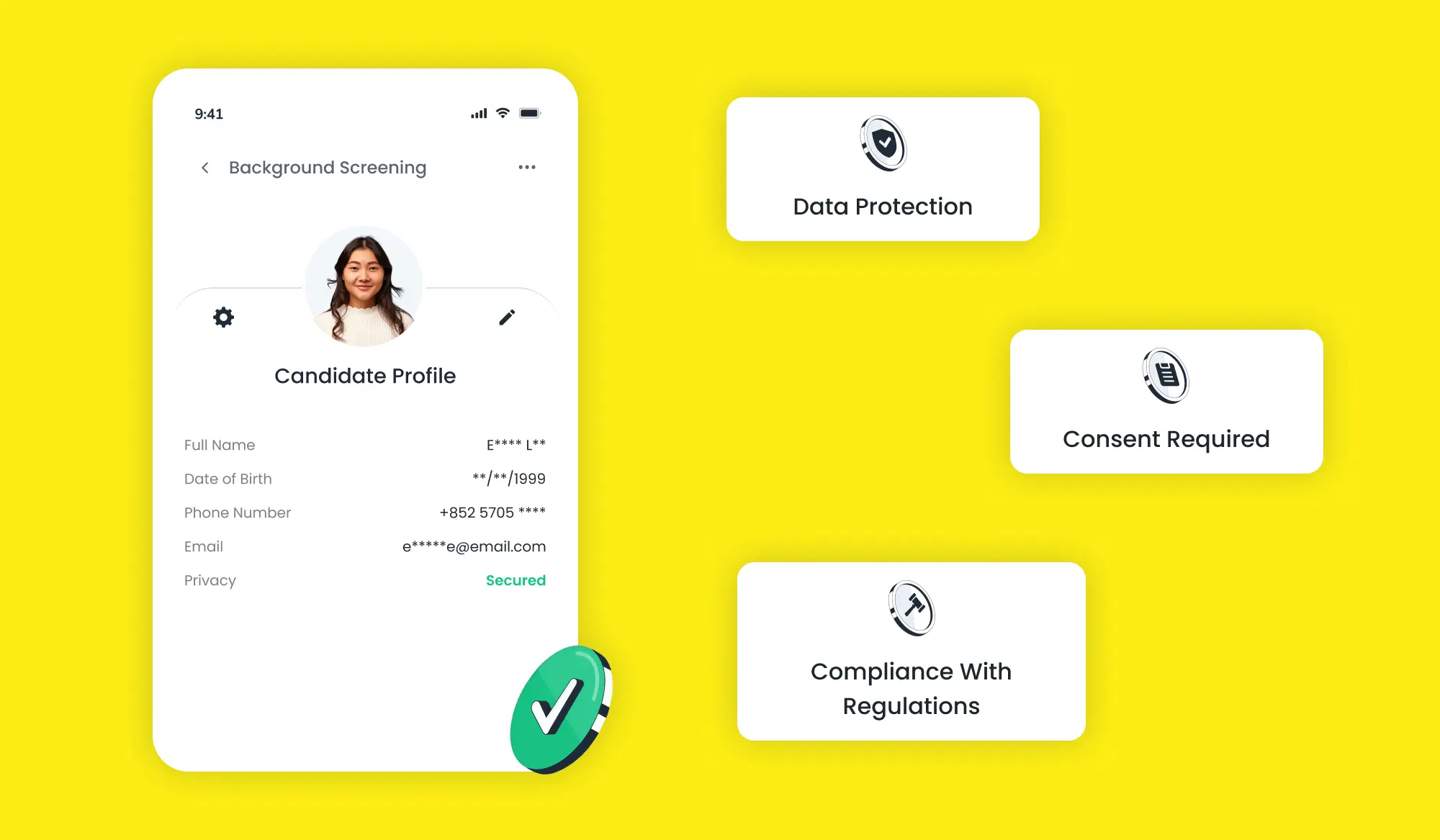Introduction
When hiring for roles that involve selling or advising on insurance policies in Hong Kong, conducting an Insurance Agent Check is not optional; it’s a legal and reputational imperative. This check plays a vital role in the hiring process for industries such as insurance, banking, wealth management, and InsurTech, ensuring candidates are properly licensed, authorized, and compliant with Hong Kong’s regulatory framework. Employers must also perform an Insurance Authority Verification to confirm the candidate’s current licensing and appointment status under the Insurance Authority (IA), reducing the risk of compliance violations. In this blog, we explain why this check matters, what’s covered, and how employers can remain compliant with Hong Kong’s evolving insurance regulatory landscape.
Why Are Insurance Agent Check Critical?
Hiring an unlicensed, improperly appointed, or unauthorized individual to act as an insurance agent in Hong Kong is not merely a hiring oversight; it is a compliance failure with potentially serious legal, financial, and reputational consequences.
Conducting a proper Insurance Agent Check ensures your organization remains compliant with the Insurance Ordinance and maintains ethical hiring practices. Here’s a breakdown of why conducting a proper insurance check is essential in today’s regulatory environment:
Regulatory Violations Under the Insurance Ordinance (Cap. 41)
The Insurance Ordinance (Cap. 41) mandates that all individuals conducting regulated insurance activities in Hong Kong must be:
- Properly licensed by the Insurance Authority (IA)
- Formally appointed by a licensed insurance company
- Operating within the permitted scope of authorization
Employing a candidate who does not meet these requirements constitutes a breach of statutory duties. In many cases, employers can be held vicariously liable for the agent’s actions, especially if the employer failed to perform adequate due diligence.
Fines, Disciplinary Action, and Criminal Liability
The IA has robust enforcement powers under the Insurance Ordinance, including the ability to:
- Impose fines on both individuals and companies
- Issue public reprimands
- Suspend or revoke licenses
- Refer serious matters for criminal prosecution
For employers, even if the violation was unintentional, regulatory negligence can still result in administrative sanctions or legal penalties, particularly if a pattern of non-compliance is found in hiring practices.
Reputational Risk and Loss of Stakeholder Trust
The insurance sector is built on consumer confidence, which is quickly eroded when firms are associated with misconduct. Hiring an unqualified or blacklisted agent can result in:
- Negative media attention
- Loss of client trust
- Increased scrutiny from regulators, partners, and auditors
For firms in banking, insurance, wealth management, and FinTech, reputational risk can directly impact investor confidence, strategic partnerships, and future license renewals.
Risk to Customers and Policyholders
Unlicensed or unauthorized individuals are not legally permitted to offer advice, sell policies, or manage insurance portfolios. Allowing such a candidate to interact with customers can lead to:
- Misinformation or misrepresentation of products
- Unsuitable policy recommendations
- Invalid or void insurance contracts
- Financial harm to customers and eventual liability claims against the employer
This kind of exposure not only harms customers but can also lead to regulatory investigations and civil lawsuits against the company.
Internal Compliance Breakdown
Failure to conduct a proper insurance agent check can point to broader internal control failures in your HR and compliance functions. Regulators may question:
- The robustness of your hiring process
- The effectiveness of your governance framework
- Your company’s overall fitness and propriety to carry on regulated activities
This can trigger wider audits, increased reporting obligations, or conditions placed on your license to operate.
By screening all candidates against the Insurance Authority (IA) and historical IARB databases, you not only protect your organization from avoidable risks but you also demonstrate a proactive culture of compliance and ethical hiring.
What’s Included in an Insurance Authority Verification?
A proper insurance agent check in Hong Kong should include the following key elements:
IARB Records Verification
This verifies whether the candidate was ever registered with the Insurance Agents Registration Board, especially relevant for professionals active before 2019. The check confirms:
- Confirm they were registered under the IARB
- Review any historical disciplinary actions or suspensions
- Identify whether they were authorized to carry out regulated activities
This historical record provides insights into the agent’s prior conduct and consistency in career history.
Insurance Licensing Checks in Hong Kong
Check if the candidate is:
- Currently registered with the Insurance Authority
- Listed as a licensed insurance agent, technical representative, or insurance broker representative
- Compliant with IA licensing rules and codes of conduct
Use the IA’s official public register to verify this.
Appointing an Insurance Company
An insurance agent in Hong Kong must be appointed by a licensed insurance company. The background check should confirm:
- The name of the insurer the agent is (or was) affiliated with
- Whether the appointment was valid and in line with the three-tied relationship rule (an agent may represent up to three insurers, one for long-term business, one for general business, and one for restricted scope travel insurance)
This helps you confirm that your candidate operated under a legally valid principal-insurer arrangement.
Date of First Registration
This reveals the first date the agent was officially registered, allowing you to:
- Cross-reference career timelines and claimed experience
- Detect possible gaps, inconsistencies, or misrepresentations
Registration Status: Active, Suspended, or Terminated
A critical part of the insurance agent check is understanding the candidate’s current standing. Determine whether they are:
- Active and in good standing
- Suspended (temporarily barred from operating)
- Terminated (either due to misconduct or voluntary resignation)
Red flags like suspensions or terminations should trigger further investigation or disqualification from the hiring process.
Scope of Authorization
Not all insurance agents are authorized to sell all types of policies. This part of the check confirms whether the candidate is authorized to:
- Deal in long-term insurance (e.g., life insurance)
- Deal in general insurance (e.g., travel, motor, home policies)
- Handle both types
It also identifies their license type under Hong Kong’s framework:
- Individual Insurance Agent: Directly appointed by a licensed insurer.
- Technical Representative (Agent): Acts on behalf of an individual agent, not directly tied to the insurer.
- Technical Representative (Broker): Supports a licensed insurance broker.
Each role has different scopes of responsibility, and hiring managers must ensure the candidate’s license type matches the job description.
Registration ID / Reference Number
A unique identifier tied to the candidate’s official registration. This is used for:
- Verifying their presence on official registers
- Auditing and reporting purposes
- Tracing any historical records or complaints
Legal and Regulatory Landscape: Hong Kong Insurance Ordinance Cap. 41 Explained
- Historical IARB records for pre-2019 activity
- Current IA status for up-to-date licensing and appointments
- Licensing requirements
- Agent appointments
- Conduct standards
- Supervisory and disciplinary mechanisms
- Candidates are registered and licensed through the IA
- Insurance agents are formally appointed by a licensed insurer
- There is no conflict of interest from multiple unauthorized insurer appointments (violating the “three-tied” rule)
- All staff adhere to the Code of Conduct for Licensed Insurance Agents
- Regulatory sanctions
- Monetary penalties
- Public disciplinary actions
- Loss of customer trust
Conclusion
In Hong Kong’s tightly regulated insurance landscape, verifying an insurance agent’s credentials is non-negotiable. Employers must go beyond surface-level checks and ensure due diligence by reviewing both the current Insurance Authority (IA) records and historical data from the Insurance Agents Registration Board (IARB), especially for candidates registered before the regulatory transition in 2019. A comprehensive background check helps safeguard your organization from legal, financial, and reputational risks. Most importantly, always confirm the candidate’s scope of authorization, license type, and appointing insurer to ensure they are fully qualified and permitted to perform the role you’re hiring for.
Want Reliable and Honest Insurance Agents?
Confirm trustworthiness, credibility, and professional integrity with comprehensive checks in Hong Kong.













